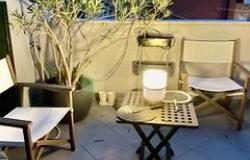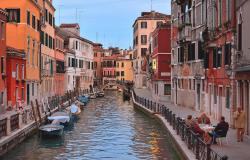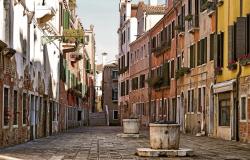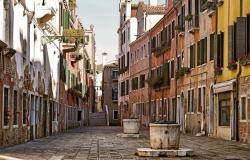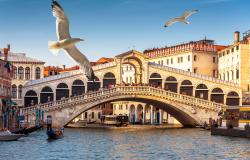 The Italian government's approval of a controversial plan to save Venice from sinking has spurred fresh praise and scorn.
The Italian government's approval of a controversial plan to save Venice from sinking has spurred fresh praise and scorn.
Despite opposition from Greens and the city council, a government panel has earmarked the last needed funds to press ahead with the long-discussed project of mobile tide barriers.
"This a triumph for good sense," said the centrist opposition UDC party, which championed the scheme while in government.
"This will turn out to be the biggest fiasco this century," said the Green Party, which is now part of Premier Romano Prodi's eight-party coalition.
It reiterated claims that Moses (Italian:Mose') would have a "devastating effect" on Venice and the delicate balance of its lagoon.
Green leader and Agriculture Minister Alfonso Pecoraro Scanio said Moses was "worse" than a now-abandoned but even more controversial scheme to build a bridge across the Messina Strait.
"It gives no assurances against high tides and will have huge maintenance costs," said Pecoraro Scanio, vowing to use an environmental-impact assessment to continue to fight the project.
He was echoed by Venice Mayor Massimo Cacciari, the only one of the panel's members to vote against the funding.
"The project is very dangerous from the environmental, engineering and financial point of view," Cacciari said.
This summer the city of Venice sent the government a list of alternative projects it felt should be considered before pressing ahead with Moses.
The Moses project consists of 79 barriers, designed to rise from the seabed to block the lagoon from the Adriatic Sea when high tides are forecast.
After 30 years of debate and testing, the project was inaugurated by then premier Silvio Berlusconi in May 2003, although work is still in the preliminary stages. Completion is scheduled for 2011.
Moses was one of the jewels in the previous centre-right government's crown of major infrastructural projects.
It is opposed by environmentalists, conservation groups and a large number of citizens, who are angry over the costs involved and concerned at the environmental impact.
Earlier this year the European Commission opened infringement procedures against Italy over the environmental impact of the flood-barrier system.
It said Italy breached EU directives by failing to produce a study of the impact Moses would have on wild birds in the Venice lagoon.
The project's supporters, however, insist that Moses is the only way to make Venice and its lagoon safe for good.
Moses has received positive assessments from the Veneto Regional Government, the Venice Water Authority, the Commission to Safeguard Venice and several teams of international experts.
The Region of Veneto's centre-right president, Giancarlo Galan, suggested the opposition to Moses was evidence of the centre-left's tendency to say no to all major infrastructure projects.
"The No party has come back to life and, as usual, it has come back by objecting to Moses," Galan said.
"These people are professionals in political lies.
"But a law is needed to stop the Moses worksites. The lies of the Green party and their centre-left comrades are not enough".
Flooding is a constant problem for Venice and the picturesque St Mark's Square is covered with water dozens of times every year.
Experts say there are three main reasons for high water in the city: the rising floor in the lagoon caused by incoming silt; the undermining of the islands by the extraction of methane gas in the sea off Venice; and the overall increase in sea levels caused by global warming.
As well as being a biblical reference to Moses' parting of the seas, the Italian name, MOSE, is an acronym for Modulo Sperimentale Elettromeccanico (experimental electro mechanical module).

